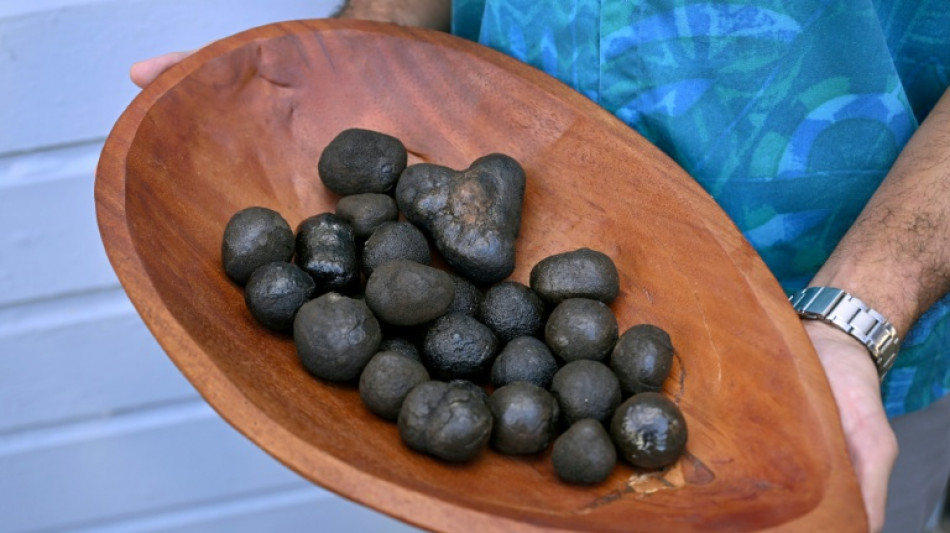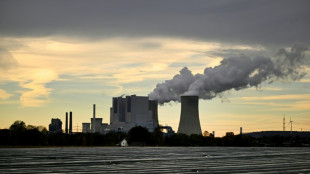
-
 'I wanted to die': survivors recount Mozambique flood terror
'I wanted to die': survivors recount Mozambique flood terror
-
Trump issues fierce warning to Minneapolis mayor over immigration

-
 Anglican church's first female leader confirmed at London service
Anglican church's first female leader confirmed at London service
-
Germany cuts growth forecast as recovery slower than hoped

-
 Amazon to cut 16,000 jobs worldwide
Amazon to cut 16,000 jobs worldwide
-
One dead, five injured in clashes between Colombia football fans

-
 Dollar halts descent, gold keeps climbing before Fed update
Dollar halts descent, gold keeps climbing before Fed update
-
US YouTuber IShowSpeed gains Ghanaian nationality at end of Africa tour

-
 Sweden plans to ban mobile phones in schools
Sweden plans to ban mobile phones in schools
-
Turkey football club faces probe over braids clip backing Syrian Kurds

-
 Deutsche Bank offices searched in money laundering probe
Deutsche Bank offices searched in money laundering probe
-
US embassy angers Danish veterans by removing flags

-
 Netherlands 'insufficiently' protects Caribbean island from climate change: court
Netherlands 'insufficiently' protects Caribbean island from climate change: court
-
Fury confirms April comeback fight against Makhmudov

-
 Susan Sarandon to be honoured at Spain's top film awards
Susan Sarandon to be honoured at Spain's top film awards
-
Trump says 'time running out' as Iran rejects talks amid 'threats'

-
 Spain eyes full service on train tragedy line in 10 days
Spain eyes full service on train tragedy line in 10 days
-
Greenland dispute 'strategic wake-up call for all of Europe,' says Macron

-
 'Intimidation and coercion': Iran pressuring families of killed protesters
'Intimidation and coercion': Iran pressuring families of killed protesters
-
Europe urged to 'step up' on defence as Trump upends ties

-
 Sinner hails 'inspiration' Djokovic ahead of Australian Open blockbuster
Sinner hails 'inspiration' Djokovic ahead of Australian Open blockbuster
-
Dollar rebounds while gold climbs again before Fed update

-
 Aki a doubt for Ireland's Six Nations opener over disciplinary issue
Aki a doubt for Ireland's Six Nations opener over disciplinary issue
-
West Ham sign Fulham winger Traore

-
 Relentless Sinner sets up Australian Open blockbuster with Djokovic
Relentless Sinner sets up Australian Open blockbuster with Djokovic
-
Israel prepares to bury last Gaza hostage

-
 Iran rejects talks with US amid military 'threats'
Iran rejects talks with US amid military 'threats'
-
Heart attack ends iconic French prop Atonio's career

-
 SKorean chip giant SK hynix posts record operating profit for 2025
SKorean chip giant SK hynix posts record operating profit for 2025
-
Greenland's elite dogsled unit patrols desolate, icy Arctic

-
 Dutch tech giant ASML posts bumper profits, cuts jobs
Dutch tech giant ASML posts bumper profits, cuts jobs
-
Musetti rues 'really painful' retirement after schooling Djokovic

-
 Russian volcano puts on display in latest eruption
Russian volcano puts on display in latest eruption
-
Thailand uses contraceptive vaccine to limit wild elephant births

-
 Djokovic gets lucky to join Pegula, Rybakina in Melbourne semi-finals
Djokovic gets lucky to join Pegula, Rybakina in Melbourne semi-finals
-
Trump says to 'de-escalate' Minneapolis, as aide questions agents' 'protocol'

-
 'Extremely lucky' Djokovic into Melbourne semi-finals as Musetti retires
'Extremely lucky' Djokovic into Melbourne semi-finals as Musetti retires
-
'Animals in a zoo': Players back Gauff call for more privacy

-
 Starmer heads to China to defend 'pragmatic' partnership
Starmer heads to China to defend 'pragmatic' partnership
-
Uganda's Quidditch players with global dreams

-
 'Hard to survive': Kyiv's elderly shiver after Russian attacks on power and heat
'Hard to survive': Kyiv's elderly shiver after Russian attacks on power and heat
-
South Korea's ex-first lady jailed for 20 months for taking bribes

-
 Polish migrants return home to a changed country
Polish migrants return home to a changed country
-
Dutch tech giant ASML posts bumper profits, eyes bright AI future

-
 South Korea's ex-first lady jailed for 20 months for corruption
South Korea's ex-first lady jailed for 20 months for corruption
-
Minnesota congresswoman unbowed after attacked with liquid

-
 Backlash as Australia kills dingoes after backpacker death
Backlash as Australia kills dingoes after backpacker death
-
Brazil declares acai a national fruit to ward off 'biopiracy'

-
 Anisimova 'loses her mind' after Melbourne quarter-final exit
Anisimova 'loses her mind' after Melbourne quarter-final exit
-
Home hope Goggia on medal mission at Milan-Cortina Winter Olympics


'Significant declines' in some species after deep-sea mining: research
Deep-sea mining could impact marine life stretching from the tiniest bottom dwellers to apex predators like swordfish and sharks, a major piece of industry-funded research found Thursday.
The Metals Company -- a leading deep-sea mining firm -- paid Australia's government science agency to pore through data collected during test mining in the remote Pacific Ocean.
Huge tracts of Pacific Ocean seabed are carpeted in polymetallic nodules, bulbous lumps of rock that are rich in metals used in battery production -- such as cobalt and nickel.
The Metals Company is pushing to be the first to mine these nodules in international waters, striving to exploit a remote expanse known as the Clarion-Clipperton Zone.
Australia's government science agency released a series of technical reports on Thursday detailing how mining could be managed.
Bottom-dwellers such as sea cucumbers, marine worms, starfish and crustaceans could see "significant declines in abundance immediately following mining", research found.
Some of these species would partially bounce back within a year, but filter feeders and other tiny organisms that feast on seabed sediments showed "minimal recovery".
"On the seafloor, our research shows that there are substantial local impacts from different mining operations," scientist Piers Dunstan said during a briefing.
Deep-sea mining companies are still figuring out the best way to retrieve nodules that can lie five kilometres (three miles) or more beneath the waves.
Most efforts focus on robotic harvesting machines, or crawlers, which hoover up nodules as they rove the ocean floor.
The Australian scientists looked at how sharks and fish might be harmed by plumes of sediment discharged as mining waste.
In some scenarios, apex predators could see toxic metals start to build up in their blood after prolonged exposure to these plumes.
"Long-lived top predators, such as swordfish and large sharks, accumulated the highest simulated metal concentrations," scientists noted in one report.
- 'Risk of harm' -
Simulations showed blood metal concentrations would not exceed international health guidelines, and impacts were less pronounced if sediment was discharged at a greater depth.
"This project helps ensure that if deep-sea mining were to go ahead, there is a clear approach to understand potential risks and impacts to marine life and ecosystems," Dunstan said.
Canada-based The Metals Company is striving to start industrial deep-sea mining in the Clarion-Clipperton Zone within the next two years.
The International Seabed Authority -- which oversees deep-sea mining in international waters -- has yet to adopt long-awaited rules governing the industry.
The Metals Company has indicated it could forge ahead even without the authority's approval, pointing to an obscure US law that says American citizens can recover seabed minerals in areas beyond the nation's jurisdiction.
The firm paid Australia's Commonwealth Scientific and Industrial Research Organisation -- or CSIRO -- around US$1 million to compile the reports.
CSIRO stressed it was not for, or against, deep-sea mining -- but that its work would help to measure and monitor impacts should it go ahead.
Energy transition expert Tina Soliman-Hunter said it was one of the "most comprehensive" pieces of research on deep-sea mining to date.
"Without such research, there is a risk of harm from mining activities that can persist for generations," said Soliman-Hunter, from Australia's Macquarie University.
Found in international waters between Mexico and Hawaii, the Clarion-Clipperton Zone is a vast abyssal plain spanning some 4 million square kilometres (1.7 million square miles).
S.Gantenbein--VB


